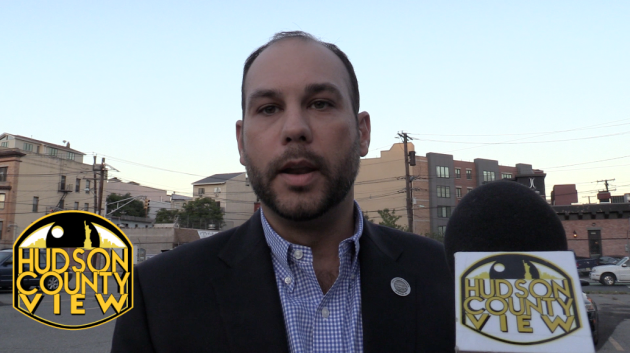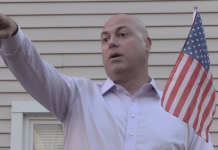While 4th Ward Hoboken Councilman Tim Occhinpinti’s cumulative to date balance from the July 15 filing is $24,448.18, his closing balance is listed as $6,358.81.
By John Heinis/Hudson County View
While the vast majority of the 13 candidates seeking a Hoboken Council seat in the November 3 elections haven’t disclosed how much money is in their campaign war chests yet, 4th Ward Councilman Tim Occhipinti currently leads the way with over $24k on hand.
After Hudson County View took a look each candidate’s filings with the New Jersey Election Law Enforcement Commission (ELEC) this afternoon, Occhipinti by far leads with way with $24,448.15 in his account, according to an online filing done on July 15.
He was first elected to office in November 2010 and has therefore been eligible to receive charitable donations towards his candidacy from that campaign forward.
Additionally, one of his opponents, Dana Wefer, the current chairwoman of the Hoboken Housing Authority, reports $3,925 in campaign contributions as of July 30.
Ruben Ramos, a former state Assemblyman and City councilman, largely viewed by politicos as the favorite in the race, filed a report on September 8, but has not reported any contributions yet.
This is a common trend thus far in the Mile Square City, as only 1st Ward Councilwoman Theresa Castellano and 6th Ward Councilwoman Jen Giattino have reported campaign contributions of $8,777.50 (as of August 20) and $3,672.94 (as of July 13), respectively.
Everyone else, with the exception of outgoing Assemblyman Carmelo Garcia (D-33) – who is expected to slug it out with Giattino as he looks to take over the Ward 6 Council seat – has filed a report with ELEC indicating that they are seeking office in the upcoming municipal election, but no contributions are listed.
Garcia’s last Assembly filing from April 15 says that he has raised a hefty $71,935 in that account.
Also worth noting is that Wefer, Giattino, Tiffanie Fisher (2nd Ward), Mike DeFusco (1st Ward) and 5th Ward Councilman Peter Cunningham filed as the joint committee “Team Zimmer for Hoboken” on September 22.
Mayor Dawn Zimmer hosted a fundraiser at Arthur’s Steakhouse on Wednesday night for the aforementioned candidates, with the campaign contributions from that event to be included on the next filing.
The Team Zimmer for Hoboken account, which lists City Council President Ravi Bhalla as their treasurer and Committeeman Phil Cohen as the committee chair, also does not list any contributions yet.












Treasurer is largely a position of campaign ethics surrounding fund raising. Crew Zimmer chooses a person who has multiple ethical violations for this role. One of the numerous poor chooices that can be attributed to Zimmer.
You are a trip. I love that you were commenting all over the city’s Facebook page at 3 am over the weekend. And that you were posting on the Hoboken Reporter site exactly at midnight when they posted their articles. Hell of a weekend right there!!
You go get em! Can we write you in since you couldn’t get anybody to sign petitions to run for council?
Actually the Crew of Zimmer uses Ray Ferraioli a strategic funding operative to skirt election pay to play laws. now it makes sense, Bhalla is the expert in skirting laws and he manages the pay-to-play through the outside consultant. We will be tied up for years more and paying out many large attorney fees when this blows up.
The most important aspect of a potentially defamatory statement is that it purports to be a statement of fact. Opinions are not defamatory. People have an absolute right to express whatever opinions they like about other people. Let’s look at some examples of facts versus opinions.
“I think that Joe is a jerk,†is an opinion. It’s not a polite opinion, but it is an opinion nonetheless. But “Joe stole $1,000 from his employer†is a statement of fact. If that statement isn’t true, it is defamatory. That is a false statement that clearly can cause injury to Joe. It could get him fired.
But what about something in between these two types of statement? What if someone says, “I think that Joe stole $1,000 from his employer.†If you qualify a statement of fact by saying “I think,†does that always turn a statement of fact into an opinion? The short answer is no. “I think that Joe is a jerk†is a pretty vague statement of opinion. But “I think that Joe stole money from his employer†implies that Joe may very well have stolen some money. The very fact that you said it implies that you may think that he did and that you want others to know that he might have stolen some money.
The bottom line — depending on who you say it to and how you say it, implying that someone did something bad by phrasing it as an opinion can be defamatory. It’s probably best to avoid saying these kinds of “gray area” things if you think that there is the slightest chance that the statement could get around.
The Statement Must Have Been Made to a Third Party
In order for a statement to be defamatory, it must have been made to a third party. A person can’t be defamed by a statement that is said or written only to him or herself.
Private Figures vs. Public Figures – Negligence vs. Intent
Simply because someone makes a defamatory statement does not automatically mean that the person will be liable for defamation. The person making the statement had to have acted inappropriately in some way. The standard of conduct required to hold a person liable for defamation depends on who was defamed.
If the person defamed was a private person, in most states, the person making the defamatory statement can only be held liable for defamation if he/she:
• knew that the statement was false and defamatory, or
• acted with reckless disregard of the truth or falsity of the statement in making the statement, or
• acted negligently in failing to ascertain whether the statement was true or false before making it.
To act in reckless disregard of the truth or falsity of a statement means that the person making the statement had serious doubts as to the truth of the statement, but they went ahead and made it anyway.
If the person defamed was a public figure, the person making the defamatory statement can only be held liable for defamation if he/she knew that the statement was false or if he/she acted with reckless disregard as to the truth or falsity of the statement.
You can see that, ultimately, the difference between defamation of a public figure versus defamation of a private person is that a private person who claims defamation only needs to prove that the defamer acted negligently, while a public figure who claims defamation has to prove that the defamer acted intentionally or recklessly.
See also Senator Sam Thompsonss crack down on skirting of pay-to-pay laws by Ray Ferraioli,, Zimmer’s strategist. Zimmer tells her followers that she needs more $$$$ to “stay on top”. Residents are being hit w have a double whammy with both Bhalla and Ferraioli.
http://www.capitalnewyork.com/article/new-jersey/2015/09/8576720/state-senator-wants-crack-down-some-political-fundraisers